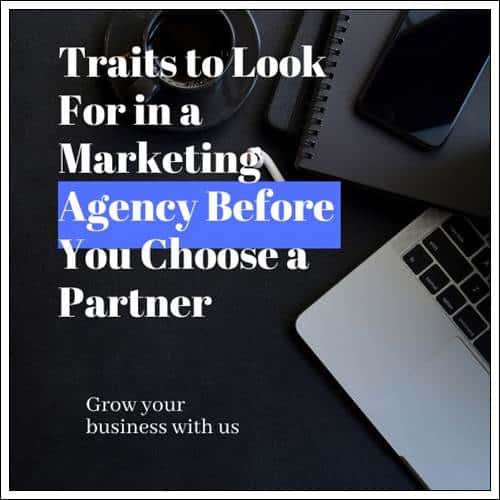
When your business is considering an external marketing agency, it’s often on the heels of a pain point. A skills gap, recruiting challenges, or budgeting constraints can halt your business, but the right marketing partner can help.
Hone in on a partner with the exact skills your team needs and get the biggest return on your investment. Plus, your team can grow and learn alongside expert marketers, bolstering your effectiveness long term. Learn which traits and factors to assess when vetting potential marketing agencies to ensure you get the right partner.
1. Evidence-Backed Results
Don’t get blinded by flashy claims from the marketers themselves; Get proof of expertise, effectiveness, and results from any agency you’re considering. Ethical marketers will always be willing to share results with potential clients. Set this expectation in any requests for proposals or during agency interviews.
Use your project goals to outline expectations so the agencies responding know how best to present their work. If you hope to improve impressions, click rates, or sales conversions, get specific. Offer this insight to attract the right respondents and fine-tune your selection process.
Peruse agency websites for case studies, which outline the type of work done for clients transparently. For example, leading marketing agency Hawke showcases case studies and refines them by industry to make it easy. Plus, they highlight the type of work done and the ROI, both of which can easily be fact-checked online.
Review client lists, campaign wins, and datasets to determine if the agency’s results stand up to their claims. You may even be able to request opportunities to speak with their other clients whose industry or marketing support needs mirror yours. Ask current agency clients about work product, client support, and results, but listen to what goes unsaid. Any hesitation or less-than-enthusiastic responses could be a red flag.
2. A Clear Client Relationship Process
Learn how your potential marketing agency works with clients before you lock down a contract. Request their pitch to include how their team likes to work down to the details. This exercise is informative, telling you: how they handle specificity, their organization skills, and how robust their process is. Circle back to client referrals to learn about their process, too, as that’s a clear indicator of typical work style.
If your request is missed, you can suspect that they’re looking for clients to plug-and-play template work. And if their client communication process is lacking, it may mean they’re sloppy or don’t care. But if their presentation highlights typical meeting cadences, shared files, and project briefings, you may be on the right road.
Strive to collaborate with an agency whose communication philosophy works well with your organization’s style and expectations. Be prepared to share expectations, too, as your organization’s needs are essential components of an agency partnership. Express reporting needs, turnaround times, and security protocols.
Some agencies may be well-versed in supporting clients in government and financial services, while others may not. If you require specific tools, channels, or agreements, include that detail in your request for proposal (RFP). Internally, decide which of these factors are deal-breakers, working with your legal and IT teams to be sure.
3. Capacity to Expand Support
You may be vetting potential agency partners for a current need, but having the capacity for growth is smart. Internally, getting a contract signed with a new agency can be tough, but the flexibility to expand is beneficial. Look at the agency’s talent lineup, sectors served, and pitch deck. Then, formulate “what ifs” specific to your organization’s potential needs and known gaps. Include these items in your RFP or standardize them as questions to ask in interviews.
If the agency you’re considering is small, don’t count a lack of full-time support against them. Many small agencies have relationships with other, more specialized, or freelance talent to serve clients when needed. You may be able to engage in the selection process, which may lead to the exact support you need.
Larger agencies may have a global perspective and talent pool that may give you an edge. Full-service agencies can also offer one-off insights from other business lines that can help determine what support is needed. No matter the size, assess potential partners for their leadership in the industry. Do they take in the request from clients or do they help tackle problems using creativity?
What works in marketing today, may not work tomorrow, so strive to partner with a creative, curious team leading the way. Industry awards and association accolades may indicate success in the field, but circle back to client satisfaction, too. No matter how flashy the campaign, the data never lies about what’s truly effective.
A Careful Vetting Process Leads to a Better Partner
Work with a small but diverse internal group to vet and decide which marketing agency is the best fit. Individually, document findings against these traits and discuss them as a group. Encourage debate to bring out concerns and get to the core of which partner could be the best fit. In doing so, your ideal choice will be clear, thanks to your thoughtful, methodical, and strategic approach. Once they’re on board, you’ll be ready to get to work alongside the marketing partner best suited for your needs.
Leave a Reply
You must be logged in to post a comment.